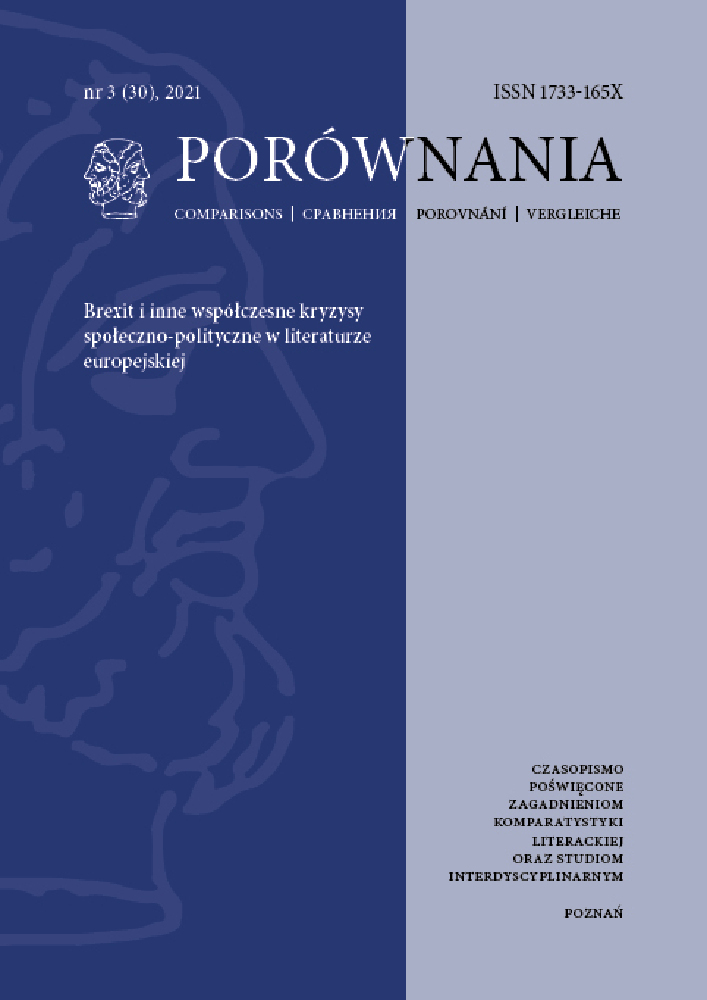Abstrakt
Artykuł poświęcony jest analizie dwóch projektów teatralnych zrealizowanych pod auspicjami instytucji narodowych – Teatru Narodowego oraz „Guardiana” we współpracy z zespołem Headlong. Celem projektodawców była analiza aktualnej sytuacji społecznej w Wielkiej Brytanii po referendum, a projekty powstały w odpowiedzi na zarzuty dotyczące utraty więzi ze społeczeństwem. Obie inicjatywy oparto na metodach stosowanych przez „teatr na faktach”, przyjmując z różną konsekwencją metody badań terenowych i tworząc archiwa wypowiedzi. Badano głównie polaryzację oraz brak zaufania społecznego. Artykuł skupia się na analizie zróżnicowanych efektów, jakie obserwujemy w Brexit Shorts oraz My Country. Efekty te, znacząco różne, prowadzą ku próbie zarówno społecznego pojednania, jak i niezamierzonego lecz wyraźnego populizmu.
Bibliografia
Boal, Augusto. “Poetics of the Oppressed.” Modern Theories of Drama. A Selection of Writing on Drama and Theatre, 1840–1990. Ed. George W. Brandt. Clarendon Press, 1998. 254–260.
Chatman, Seymour. Coming To Terms: The Rhetoric of Narrative Fiction and Film. Ithaca: Cornell University Press, 1990.
Cox, Jo. “Devolution and Growth Across Britain.” Volume 596. Wednesday 3 June 2015. UK Parliament. https://tinyurl.com/tn44e9nh. Accessed 27 June 2017.
Dickson, Andrew. “Tom Stoppard: Brexit is Too Big for the Stage.” The Guardian 10 February 2017. https://tinyurl.com/3zefrxwe. Accessed 19 June 2017.
Duffy, Carol Ann, Rufus Norris. My Country: Work in Progress. London: Faber and Faber, 2018.
Edgar, David. “A Hard Time for British Plays: David Edgar Defends the Vibrancy of British Playwriting.” Hard Times 91 (2012): 7–12.
Finlayson, Alexander. “Ideology and Political Rhetoric.” The Oxford Handbook of Political Ideologies. Eds. Freeden, M., Sargent, L. T. and M. Stears. Oxford: Oxford University Press. 2013. 197–213.
Ford, Leighton. “Listening.” Lifelong Leadership: Woven Together through Mentoring Community. Ed. Mary Kate Morse. Colorado Springs: NavPress, 2020. 95–112.
Genette, Gérard. Paratexts: Thresholds of Interpretation. Cambridge: Cambridge University Press, [1997] 2001.
Genova, Alexandra. Conversations and Film Screening at Goethe Institut: Dramas from a Divided Europe. 2019. Accessed 12 Dec. 2020.
GNM press office. “The Guardian and Headlong present Brexit Shorts: Dramas from a Divided Nation.” The Guardian 19 June 2017. https://tinyurl.com/5pudpydc. Accessed 20 June 2017.
Graham, James. “Burn.” (Brexit Shorts). The Guardian 26 June 2017. Accessed 28 June 2017.
Gregg, Stacey. “Your Ma’s a Hard Brexit.” (Brexit Shorts). The Guardian 19 June 2017. Accessed 25 June 2017.
Hammond, Will, and Dan Steward. Verbatim, Verbatim: Contemporary Documentary Theatre. London: Oberon Books, 2008.
Hare, David. “Time to Leave.” (Brexit Shorts). The Guardian 19 June 2017. Accessed 25 June 2017.
Hare, David. Stuff Happens. London: Faber and Faber, 2005.
Hemley, Matthew. “Rufus Norris Says the Arts Are ‘Out of Touch.’” The Stage, 26 July 2016. https://www.thestage.co.uk/news/rufus-norris-says-the-arts-are-out-of-touch. Accessed 27 June 2017.
Innes, Christopher. “Towards a Post-Millennial Mainstream? Documents of the Times.” Modern Drama 50.3 (2007): 435–452. Project Muse, doi: https://doi.org/10.1353/mdr.2007.0055.
James, Charlene. “Go Home.” (Brexit Shorts). The Guardian 19 June 2017. Accessed 25 June 2017.
Jowell, Tessa. “Government and the Value of Culture.” 2004. 1–19. Shiftyparadigms.org. Accessed 2 June 2014.
Kennedy, A. L. “Permanent Sunshine.” (Brexit Shorts). The Guardian 19 June 2017. Accessed 25 June 2017.
Krämer, Benjamin. “Media Populism: A Conceptual Clarification and Some Theses on Its Effects.” Communication Theory 24:1 (2014): 42–60.
Kritzer, Amelia Howe. Political Theatre in Post-Thatcher Britain. New Writing: 1995–2005. New York: Palgrave Macmillan, 2008.
Lane, David. Contemporary British Drama. Edinburgh: Edinburgh University Press, 2010.
Laurie, Campbell. “How They Created the NT’s Brexit Play My Country.” WhatsOnStage. 10 March 2017, https://tinyurl.com/y9p323ay. Accessed 27 July 2017.
Martin, Carol. “Bodies of Evidence.” TDR: The Drama Review 50:3. 2006: 8–15. JSTOR, www.jstor.org/stable/4492691.
Morgan, Abi. “The End.” (Brexit Shorts). The Guardian 26 June 2017. Accessed 28 June 2017.
Mudde, Cas. “The Populist Zeitgeist.” Government and Opposition 39:4. 2004: 542–563.
Owen, Gary. “The Pines.” (Brexit Shorts). The Guardian 26 June 2017. Accessed 28 June 2017.
Peake, Maxine. “Shattered.” (Brexit Shorts). The Guardian 26 June 2017. Accessed 28 June 2017.
Pinter, Harold. “Harold Pinter: Art, Truth & Politics”. Nobel Lecture, December 7, 2005.
Sierz, Alex. “British Theatre after Brexit: One Year On.” A Journal of Performance and Art 120 (2018): 60–70.
Sierz, Alex. “Dark Times: British Theatre after Brexit.” A Journal of Performance and Art 115 (2017): 3–11.
Syal, Meera. “Just a T-Shirt.” (Brexit Shorts). The Guardian 19 June 2017. Accessed 25 June 2017.
Trilling, Lionel. Sincerity and Authenticity. Cambridge, MA: Harvard UP, 1972.
Weidle, Roland. “Mimetic Narration: Documentary Theatre and the Staging of Truth.” Narrative in Drama. Eds. Merle Tönnies and Christina Flotmann. Trier: WVT, 2011. 73–94.
Weyland, Kurt. “Clarifying a Contested Concept: Populism in the Study of Latin American Politics.” Comparative Politics 34.1 (2001): 1–22
Wodak, Ruth. “‘We have the Character of an Island Nation.’ A Discourse-Historical Analysis of David Cameron’s ‘Bloomberg Speech’ on the European Union.” EUI Working Paper RSCAS 36 (2016): 1–25.
Licencja
Utwory opublikowane w czasopiśmie „Porównania”, na platformie Pressto należącej do Uniwersytetu im. Adama Mickiewicza w Poznaniu są udostępniane na licencji Creative Commons Uznanie autorstwa - Bez utworów zależnych 4.0 Międzynarodowe (CC BY-ND 4.0)
Tym samym wszyscy zainteresowani są uprawnieni do korzystania z utworów opublikowanych pod następującymi warunkami:
-
uznania autorstwa — czyli obowiązek podania wraz z rozpowszechnianym utworem informacji o autorstwie, tytule, źródle (odnośniki do oryginalnego utworu, doi) oraz samej licencji
-
bez utworów zależnych — remiksując, przetwarzając lub tworząc na podstawie utworu, nie wolno rozpowszechniać zmodyfikowanych treści.
-
brak dodatkowych ograniczeń — nie można korzystać ze środków prawnych lub technologicznych, które ograniczają innych w korzystaniu z utworu na warunkach określonych w licencji.
Uniwersytet im. Adama Mickiewicza w Poznaniu zachowuje prawo do czasopisma jako całości (układ, forma graficzna, tytuł, projekt okładki, logo itp.).
Autor zachowuje prawa majątkowe, ale udziela zgody Uniwersytetowi im. Adama Mickiewicza w Poznaniu na wykorzystanie dzieła. Autorzy tekstów zakwalifikowanych do publikacji proszeni są o wypełnienie podpisanie i przesłanie umowa (PL) agreement (EN)
Agreement for granting a royalty-free license to works with a commitment to grant a CC sub-license





